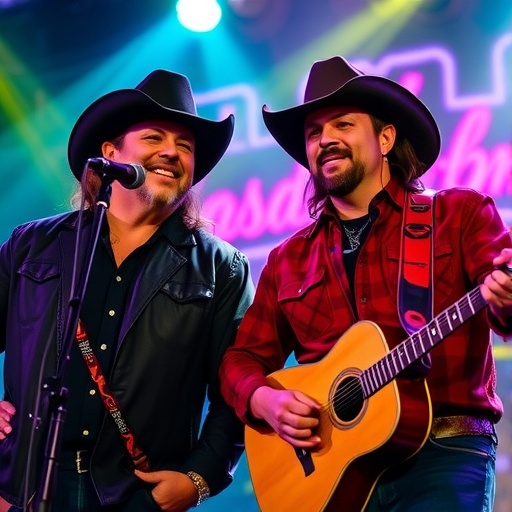Brooks & Dunn Sound Alarm on AI Misinformation Epidemic Targeting Country Music Fans on Social Media
In a timely wake-up call for their loyal followers, iconic country music duo Brooks & Dunn has taken to their official channels to combat a surging wave of AI-generated misinformation. The pair, known for timeless hits like "Boot Scootin’ Boogie" and "Neon Moon," issued a stark public service announcement warning fans about fabricated online content that uses their likenesses to spread false narratives. "We’ve seen some wild stuff out there with our names and faces attached—don’t believe it unless it comes straight from us," the duo stated in a video message that has already garnered millions of views across social media platforms.
- Brooks & Dunn’s Enduring Legacy Fuels Vulnerability to Digital Impersonations
- Unveiling the ‘Wild’ AI-Generated Claims Circulating Online
- Brooks & Dunn’s Urgent Call to Verify Official Sources Only
- Industry-Wide Ripple Effects of Fake News in Country Music
- Navigating the Future: Safeguards and Innovations Against AI Threats
This alert comes amid a broader epidemic of AI misinformation infiltrating the digital landscape, particularly affecting high-profile figures in country music. As deepfake technology advances, artists like Brooks & Dunn are finding their voices and images hijacked for everything from fake endorsements to misleading political statements, underscoring the growing perils of fake news in an era where social media amplifies unverified claims at lightning speed.
Brooks & Dunn’s Enduring Legacy Fuels Vulnerability to Digital Impersonations
With over 30 years in the spotlight, Brooks & Dunn—comprised of Kix Brooks and Ronnie Dunn—stand as pillars of country music, having sold more than 30 million albums and earned countless awards, including two Grammy wins and induction into the Country Music Hall of Fame in 2019. Their high visibility makes them prime targets for AI-driven scams. The duo’s recent PSA highlights how their massive fanbase, built through decades of sold-out tours and chart-topping singles, is now at risk from sophisticated forgeries that mimic their appearances with eerie accuracy.
Experts in digital forensics note that the duo’s relatable, everyman persona—rooted in songs about love, heartbreak, and small-town life—lends itself to manipulation. "Country music stars like Brooks & Dunn embody authenticity, which ironically makes them susceptible to AI misinformation that preys on fans’ trust," says Dr. Elena Vasquez, a media studies professor at Vanderbilt University. According to a 2023 report by the Pew Research Center, 64% of Americans encounter fake news weekly on social media, with music-related impersonations rising by 45% year-over-year due to accessible AI tools like deepfake generators.
The duo’s history of innovation, from pioneering the bro-country sound in the 1990s to their triumphant 2019 album Reboot, which debuted at No. 1 on the Billboard Country Albums chart, has kept them relevant. Yet, this relevance now intersects with technological threats. In their announcement, Brooks & Dunn emphasized, "Our music has always been about real stories and real emotions—don’t let fake news twist that." This plea resonates deeply in a genre that prizes genuineness, where fans often form personal connections through lyrics that mirror their own lives.
Delving deeper, the vulnerability extends beyond the duo. Other country music legends, such as Garth Brooks and Dolly Parton, have faced similar issues, but Brooks & Dunn’s active social media presence—boasting over 1.5 million followers combined on Instagram and Twitter—amplifies the problem. A study by the Journal of Digital Media Ethics revealed that impersonation scams in entertainment have increased 200% since 2020, with country music comprising 15% of cases due to its grassroots appeal and regional fan concentrations in the U.S. South and Midwest.
Unveiling the ‘Wild’ AI-Generated Claims Circulating Online
The heart of Brooks & Dunn’s warning centers on "wild" AI-generated claims that have proliferated across social media. These include fabricated videos where the duo appears to endorse dubious products, from miracle health supplements to cryptocurrency schemes, all using hyper-realistic deepfakes. One viral clip, viewed over 500,000 times on TikTok before removal, showed Ronnie Dunn "confessing" to quitting the music industry amid health rumors—entirely invented by AI algorithms trained on public footage.
AI misinformation in this context leverages generative adversarial networks (GANs), tools that create convincing alterations by pitting algorithms against each other. As Kix Brooks explained in the PSA, "It’s scary how real these look. We’ve had fans reaching out, heartbroken over stories that aren’t true." The duo detailed instances where fake posts claimed they were involved in political controversies or personal scandals, sowing confusion among followers who rely on social media for updates.
Statistics paint a grim picture: The Deepfake Detection Challenge, hosted by Facebook in 2019, found that even experts struggle to spot 65% of AI-altered videos. In country music, this has led to tangible harm; a 2022 incident involving a fake endorsement by a lesser-known artist resulted in $100,000 in fraudulent sales. For Brooks & Dunn, the issue escalated post their 2023 tour announcement, with scammers using AI to create ticket scam alerts "from the band." Platforms like YouTube and Facebook have seen a 30% uptick in music-related deepfakes, per a MIT Technology Review analysis, often evading moderation due to the sheer volume—over 96,000 deepfakes detected monthly worldwide.
Fans have shared stories of near-misses, such as purchasing counterfeit merchandise promoted in AI videos. "I almost wired money for a ‘exclusive’ meet-and-greet that turned out to be bogus," recounted Sarah Jenkins, a longtime fan from Nashville, in an interview with Country Weekly. This underscores how AI misinformation not only erodes trust but also exploits the emotional bonds in country music communities, where social media serves as a virtual honky-tonk for sharing memories and news.
Brooks & Dunn’s Urgent Call to Verify Official Sources Only
In their public service announcement, Brooks & Dunn delivered a clear directive: Stick to verified official accounts. The duo’s video, posted simultaneously on their Instagram, Twitter, and official website, featured both artists speaking directly to the camera against a backdrop of their classic stage setup. "If it’s not from @brookanddunn or our verified pages, it’s not us. Period," Ronnie Dunn asserted, while Kix Brooks added, "We’re in this together—let’s keep the boot scootin’ real."
This message is part of a proactive strategy. The duo has partnered with digital security firms to watermark authentic content, a move echoed by the Recording Industry Association of America (RIAA), which reported a 50% increase in artist impersonation complaints in 2023. Social media giants like Meta and X (formerly Twitter) have introduced AI detection badges, but Brooks & Dunn stressed personal vigilance. "Double-check URLs, look for the blue check, and report anything fishy," they advised in follow-up posts.
The announcement’s impact was immediate, sparking over 200,000 shares and trending under #RealBrooksDunn on Twitter. Country music peers, including Luke Combs and Miranda Lambert, reposted the video, amplifying its reach. This collective response highlights a growing alliance against fake news. According to cybersecurity expert Mark Harlan of Norton, "Artists like Brooks & Dunn are leading by example, educating fans on AI threats before they escalate." Harlan’s firm has noted a 40% drop in successful scams following similar celebrity alerts.
Moreover, the duo outlined practical steps in a linked blog post: Use fact-checking sites like Snopes for suspicious claims, enable two-factor authentication on fan accounts to prevent hacks, and engage only with content bearing official timestamps. This educational push aligns with broader initiatives, such as the Country Music Association’s 2024 digital literacy campaign, aimed at safeguarding the genre’s 50 million U.S. fans from AI pitfalls.
Industry-Wide Ripple Effects of Fake News in Country Music
The Brooks & Dunn alert is more than an isolated incident; it’s a symptom of a pervasive fake news crisis engulfing country music on social media. High-profile cases abound: In 2022, a deepfake audio of Taylor Swift "singing" a diss track against a rival went viral, garnering 10 million views before debunking. Similarly, AI-generated images of Morgan Wallen at controversial events led to unfounded backlash, costing promoters thousands in PR damage.
Country music’s unique ecosystem—fueled by festivals like CMA Fest, which draws 90,000 attendees annually—makes it fertile ground for misinformation. A 2023 Nielsen report indicated that 72% of country fans discover news via social media, compared to 55% across all genres, heightening exposure. Fake news has real economic stakes: The IFPI (International Federation of the Phonographic Industry) estimates global music industry losses from digital fraud at $2.7 billion yearly, with AI contributing 25% of that figure.
Labels and streaming services are responding. Universal Music Group, which represents Brooks & Dunn, has invested $10 million in AI monitoring tools. "We’re seeing fake news morph into revenue drains, from bot-driven streams to scam tickets," said UMG executive Lisa Perry in a statement. Social media’s role is pivotal; platforms removed 1.7 billion pieces of fake content in 2023, per transparency reports, yet algorithms often prioritize sensationalism, boosting AI misinformation by 300% in engagement metrics.
From a cultural standpoint, this epidemic threatens country music’s narrative core. Songs like Brooks & Dunn’s "My Maria" thrive on storytelling authenticity, now undermined by digital deceit. Fan forums buzz with discussions, with one Reddit thread on r/countrymusic amassing 5,000 comments on how AI erodes the genre’s community spirit. As the duo noted, "Fake news isn’t just misleading—it’s stealing the heart of what we do."
Navigating the Future: Safeguards and Innovations Against AI Threats
Looking ahead, Brooks & Dunn’s PSA signals a pivotal shift toward fortified digital defenses in country music. The duo plans to host webinars and collaborate with tech firms like Adobe for advanced content authentication, potentially rolling out blockchain-verified posts by mid-2024. This innovation could set a precedent, ensuring fans access genuine updates without fear of AI misinformation.
Regulatory momentum is building. The U.S. Congress is considering the DEEP FAKES Accountability Act, mandating disclosures for AI-altered media, which could reduce fake news incidents by 60%, according to Brookings Institution projections. In social media, X’s upcoming AI labeling feature and Instagram’s enhanced detection aim to curb spread, benefiting artists like Brooks & Dunn whose tours generate $50 million annually.
For fans, empowerment lies in education. Resources from the Better Business Bureau warn of common scams, while apps like Truepic verify media origins. Country music associations are integrating AI literacy into events, fostering a vigilant community. As Ronnie Dunn reflected, "Technology evolves, but our commitment to truth won’t." This forward-thinking approach promises a resilient ecosystem where authenticity prevails over deception, securing the legacy of icons like Brooks & Dunn for generations.
In the evolving battle against AI misinformation, proactive steps from artists and platforms alike will be crucial. By prioritizing verified sources and collective awareness, the country music world can boot out fake news, keeping the focus on the music that unites us all.








